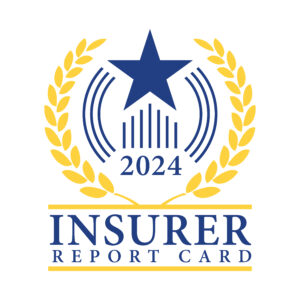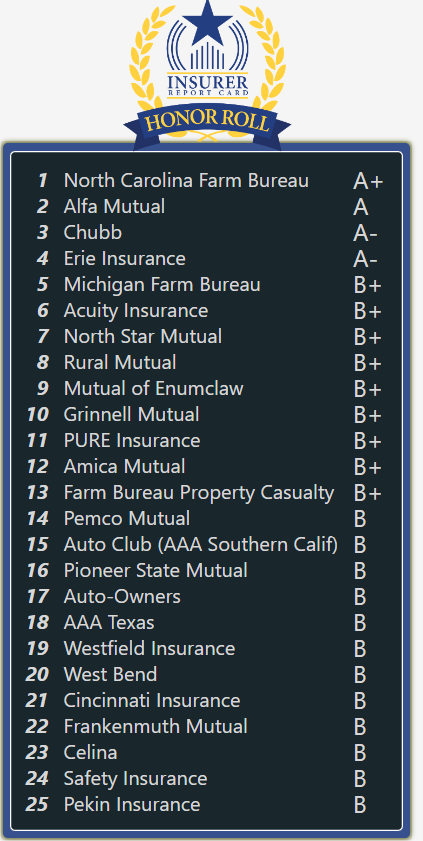
Repairers again rate 10 largest carriers poorly on ‘Insurer Report Card’
By onInsurance
Twenty-five out of more than 88 auto insurance companies graded by collision repairers on quality repairs and customer service received a B or higher to earn a spot on this year’s Honor Roll in the annual CRASH Network “Insurer Report Card.”
A record 19 companies, including six of the largest U.S. auto insurers, received a grade of C- or lower. None of the 10 largest and best-known auto insurers received an overall grade higher than a C+. Those include American Family, Nationwide, Travelers, Progressive, Farmers Insurance, State Farm, GEICO, USAA, Liberty Mutual/Safeco, and Allstate.
More than 50 other insurers scored higher than the top 10 insurers.
Body shops were asked to evaluate how well each insurer’s “policies, attitude, and payment practices ensure quality repairs and customer service for motorists.”
North Carolina Farm Bureau (A+), Alfa Mutual (A), Chubb (A-), and Erie Insurance (A-) finished with the top grades among all insurers for the second year in a row. Many of the highest-graded insurers including Michigan Farm Bureau (B+), Acuity Insurance (B+), North Star Mutual (B+), and Mutual of Enumclaw (B+) don’t sell policies in all 50 states.
More than 1,100 individual body shops around the country each graded as many as 30 different insurance companies in their state.
More than 89% of survey respondents who responded to follow-up questions based on other answers given said North Carolina Farm Bureau is more likely than others to pay for quality parts instead of pushing for low-quality parts based on price. Conversely, 5% of shops said that about Allstate.
“Shops say the lower-graded insurance companies tend to have less experienced claims personnel, push shops to install used or lower-quality parts, don’t encourage the use of automaker-recommended repair procedures or are slow to respond to shops’ requests for reviews and thus increase the time it takes to complete repairs for the customer,” CRASH Network’s survey report states.
Shops participating in the “Insurer Report Card” said the highest-graded insurers “trust that the shop is the repair professional, want their customers treated right with a quality outcome, are more willing to pay for quality repairs and parts, and are quick to respond.”
“Most consumers are unaware they may have a dozen or more other choices in their state than the insurers whose advertising they see over and over,” said CRASH Network’s John Yoswick, in a Monday press release. “The ‘Insurer Report Card’ gives the industry a way to communicate what shops see in terms of which companies are better at taking care of policyholders when they have a claim, and which ones have room for improvement. That can give consumers something else to consider as they choose an insurer.”
The list of highest-graded insurers in 2024 was remarkably consistent with the prior year’s findings; seven of the 10 highest-graded insurers were in the top 10 last year as well.
The survey does, however, come with one caveat. How body shops grade a particular insurance company’s claims service could be affected by whether or not the shop is a member of the carrier’s affiliated network of body shops, or a direct repair program (DRP). That said, GEICO and Kemper both earned a C+ from their DRP shops compared to only a slight difference from non-affiliated shops who gave both companies a C-.
The report provides an annual Honor Roll, which lists the 25 insurers that earned an overall grade of B or higher on a national basis. The report provides each company’s score and the states they offer policies.
A free report with the 2024 “Insurer Report Card” findings can be downloaded at crashnetwork.com/irc.
Consumers have been advised by Consumers’ Checkbook to shop for auto insurance annually, and doing so could allow repairers to share the results they receive and provide additional insight into what the industry is looking for in a highly-graded insurer.
For example, the nonprofit Consumers’ Checkbook found that most policyholders in the Puget Sound region of Washington could save hundreds, many more than $1,500, annually by switching carriers.
One of Checkbook’s illustrative couples, living in Seattle with two cars and clean driving records, would pay $1,120 per year with Progressive, $1,508 with Amica, or $1,515 with GEICO compared to $2,376 with American Family, and $3,662 with Grange.
If they moved to Pierce County and added a teenager to their policy, their annual premium would be $1,932 with Progressive, $2,434 with The Hartford, or $2,694 with Travelers, but $6,438 with Grange and $7,812 with National General.
Checkbook’s illustrative retired couple with two cars and clean driving histories living in Snohomish County would pay $1,570 per year with Progressive or $1,607 with GEICO compared to $2,962 with Allstate, $3,227 with Liberty, and $3,386 with Grange.
Images
Featured image provided by CRASH Network

